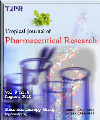
|
Tropical Journal of Pharmaceutical Research
Pharmacotherapy Group, Faculty of Pharmacy, University of Benin, Benin City, Nigeria
ISSN: 1596-5996
EISSN: 1596-5996
Vol. 16, No. 8, 2017, pp. 1939-1949
|
 Bioline Code: pr17246
Bioline Code: pr17246
Full paper language: English
Document type: Research Article
Document available free of charge
|
|
|
Tropical Journal of Pharmaceutical Research, Vol. 16, No. 8, 2017, pp. 1939-1949
| en |
Methicillin-resistant Staphylococcus aureus  isolates from Iranian restaurant food samples: Panton-Valentine Leukocidin, SCCmec phenotypes and antimicrobial resistance isolates from Iranian restaurant food samples: Panton-Valentine Leukocidin, SCCmec phenotypes and antimicrobial resistance
Ranjbar, Reza; Shahreza, Mohammad Hossein Sakhaei; Rahimi, Ebrahim & Jonaidi-Jafari, Nematollah
Abstract
Purpose: To assess the distribution of Panton-Valentine Leukocidin, SCCmec types and antimicrobial
resistance pattern of methicillin resistant Staphylococcus aureus isolated from restaurant food.
Methods: Five-hundred and eighty food samples were collected and directly transported to the
laboratory. Samples were cultured and S. aureus strains were confirmed using biochemical tests.
MRSA strains were determined using polymerase chain reaction (PCR)-based amplification of mecA
and femA genes. MRSA strains were then subjected to disk diffusion
methods.
Results: One-hundred and nineteen out of 580 samples (20.51 %) were positive for S. aureus. Eighty-three
out of 119 S. aureus (69.74 %) were methicillin-resistant. Thirty-nine out of 83 MRSA samples
(46.98 %) harbored PVL gene. Cooked chicken (37 %) had the highest prevalence of S. aureus. Marked
seasonality was observed for the prevalence of bacteria. MRSA strains exhibited high resistance
against penicillin G (100 %), tetracycline (92.77 %), oxacillin (83.13 %) and azithromycin (71.08 %). All
MRSA bacteria were resistant to at least 2 antibiotics (100 %). TetK (80.72 %), linA (67.46 %), aadA1
(62.65 %), and msrA (55.42 %) were the most frequently identified resistance genes. SCCmec V (57.83
%), SCCmec Iva (55.42 %) and SCCmec IVb (30.12 %) were the most frequent.
Conclusion: Based on the high prevalence of resistant MRSA strains and also high consumption rate
of restaurant foods in Iran, it is essential to exercise control over the hygienic conditions of restaurant
foods to minimize MRSA strains.
Keywords
Methicillin-resistant Staphylococcus aureus (MRSA); Antibiotic resistance; SCCmec types; Panton-Valentine Leukocidin; Restaurant food
|
| |
© Copyright 2017 - Pharmacotherapy Group, Faculty of Pharmacy, University of Benin, Benin City, 300001 Nigeria.
Alternative site location: http://www.tjpr.org
|
|
